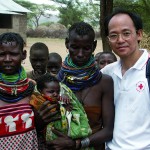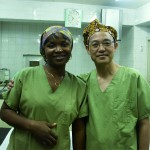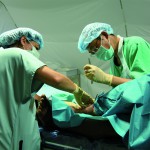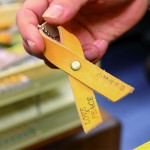Veteran of numerous overseas humanitarian missions tells of heartbreak over Hong Kong
By Karen Yu
Most of us are brought up to be kind and always lend a helping hand to others, and most of us find it is easier said than done. Not so Au Yiu-kai, a 56-year-old consultant surgeon at Kwong Wah Hospital, who has made it his mission in life to do both. Au has saved lives in conflict zones as a volunteer for the Hong Kong Red Cross and Médecins Sans Frontières (MSF). Closer to home, he founded the Hong Kong Wheelchair Aid Service, a wheelchair repair and rental service in 1997.
Au’s resolve to become a doctor and his devotion to service are, in large part, motivated by the loss of his mother to kidney disease when he was a young boy and his brother to cancer when he was a medical student. His commitment is also driven by his Catholic faith. Today, serving people is what makes him happy and he smiles readily when recalling the stories he has encountered along the way.
Au first started to help the needy in 1987. He launched a monthly free clinic service for the residents of a former coal mining village in Ma On Shan. “Wherever there is need, I will continue to do it,” he says. He has kept his promise to his elderly patients there – most of them are retired miners and their families – for 28 years.
In 2002, Au’s personal mission to help the underprivileged took a different turn – it went global. A doctor friend attended a talk+ by the Hong Kong Red Cross to recruit volunteers for medical missions overseas. He suggested Au had the right skills for the job and Au decided to give it a go.
That is how he ended up working in a hospital in Kenya, operating on the war wounded from South Sudan. Since then, he has been volunteering for the Hong Kong Red Cross and MSF in many conflict and disaster areas. Recognition of this work won him the Hong Kong Humanity Award in 2009.

The year 2002 does not just mark the beginning of Au’s involvement in overseas humanitarian medical service. It also marks a turning point in Au’s perspective on the medical profession and his place in it. Most notably, it affirmed his belief in the importance of traditional surgical skills and his own persistence in practising those skills.
Au says that since 1990, there has been a growing use of high technology in medicine and a trend towards conducting minimally invasive surgery in Hong Kong. But having spent his whole working life in no-frills public hospitals, Au trained in and uses traditional and basic surgical techniques.
The rapid adoption of high technology in medicine initially led Au to begin to doubt his ability. But the chance to work in disaster and conflict areas restored his confidence and gave him immense satisfaction.
Out in the field, with a lack of resources and support, traditional surgical skills become the most reliable tools in the surgical theatre – they are what Au has persisted in and excels at.
“You are the only doctor and you are the last one,” says Au. “You are not supposed to think whether you can do it or not, but how to do it.”
Over a period of 13 years, Au has been to 13 different places on different humanitarian medical missions. This makes him the medical volunteer who has participated in the most missions from Hong Kong. In 2008, Au went to Sichuan after the magnitude 7.9 earthquake that killed more than 80,000 people and injured many more. Later, he also worked in Haiti and Indonesia after earthquakes in those countries. In 2013, he went to the Philippines, after it was ravaged by super Typhoon Haiyan. Au has also volunteered to treat those in conflict zones such as Gaza, Liberia and South Sudan.

Each mission brings him great satisfaction and he is animated as he recalls them excitedly. He says they all are very unique to him as he can always experience new things.
Sometimes, this means encounters with unpredicted dangers. Once, during a mission to Pakistan in 2012, Au’s workplace came under attack from the Taliban. While Au was performing an operation, a colleague suddenly knocked on the door and cried “evacuation!” At first, Au thought it was a joke. But soon, he realised it was not. Everyone had to pack up immediately and leave following a designated route within five minutes.
“I thought I was experienced enough and wouldn’t be intimidated by the Taliban. But still, my hands were shaking when evacuating,” Au laughs.
Although Au is not discouraged or daunted by such dangers, it is another matter for his family members. He knows he is fortunate to have the unconditional support of his wife and son. They made no exception about Au’s mission to Gaza last July, during hostilities between Israel and Hamas in Palestine. Au says it was the first time he had been to a war zone and he was prepared for the worst. “I found my medical student and my son to say my last words [before I left for the mission],” he says.
Witnessing how Israeli airstrikes devastated Gaza strip, what deeply touched Au was how the local doctors and nurses persisted in safeguarding their homeland. “They don’t want wars. They just want to live with dignity,” he says.

He found similar sentiments a few months later among the young people who participated in Hong Kong’s Umbrella Movement to fight for a better Hong Kong.
While some doctors signed a petition to condemn the movement as a “cancer” damaging Hong Kong, Au used his expertise to support the 79-day movement as the volunteer leader of the Occupy Central with Love and Peace (OCLP) medical team.
The Occupy Movement was not the first political campaign Au has joined. He has long been concerned about Hong Kong’s political development and has participated in different social campaigns.
Au also headed the team of medical personnel supporting the hunger strikers during the anti-national education campaign in 2012. Back in 2000, he joined the Hong Kong Democratic Development Network (HKDDN). This is where he met the Rev Chu Yiu-ming, one of the co-founders of Occupy Central, who later invited him to head the OCLP medical team.
When Beijing announced the “8.31” framework for the 2017 Chief Executive election, Au was still in Gaza. Fortunately, before going to Gaza, Au had already contacted people who had been medical volunteers in the anti-national movement, and organised meetings and preparations. Therefore, the medical team was able to operate smoothly even though the movement kicked off unexpectedly and earlier than the planned sit-in to paralyse Hong Kong’s financial district.
At the beginning of the movement, Au had full confidence that Hong Kong could finally reach a mutually acceptable agreement on democratic development. But his hope was gradually replaced with disappointment and anger when he witnessed police brutality and what he describes as the cold response of the Hong Kong government.
Taliban attacks and Israeli airstrikes have not deterred Au from his determination to serve in conflict zones but the ending of the Umbrella Movement without any substantial concessions from the government has left him despondent.
During the movement, Au posted a slogan on his Facebook page, “Israel is China. Gaza is Hong Kong”. For him, Gaza is in the grip of Israel in terms of its geographical constraints and resources, just as Hong Kong is under the Mainland’s control.

Au has now resigned all his posts in governmental organisations and is considering taking early retirement. “Because I have no motivation. I want to leave and I am so disappointed at the Hong Kong government,” he says.
Now, he plans to spend more time working for MSF after retirement. Au thinks this would be more rewarding than staying in Hong Kong and fighting for what he believes he will never achieve. “In the past 13 years and 13 missions, every effort has been worthwhile. But it was useless what I did in the past few months [in the movement]. Given that, why shouldn’t I spend my strength, effort, dedication and knowledge in other places and make it worthwhile?”
Many will be sad to see Au retire, but they can take heart that he has not given up his determination to help more people in the future. “There are 14,000 doctors in Hong Kong. But in those disaster and conflict areas, there could be not a single one,” he says. “You are the only doctor there and you are the last one.”
Edited by Tracy Cheung











































